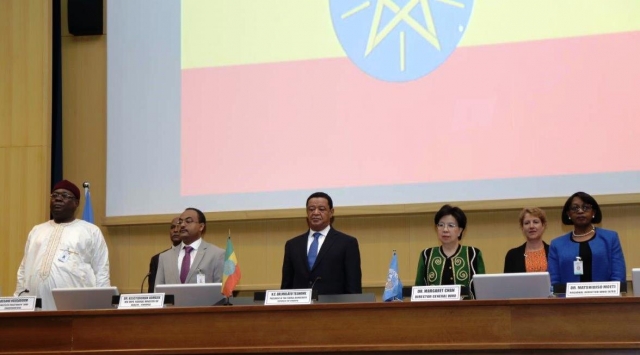African governments urged to prioritise health in their development efforts
 Addis Ababa, 19 August 2016 – Health ministers from the World Health Organization’s (WHO) African Region have begun a five-day meeting to discuss some key health issues affecting the Region. Addressing the opening session in Addis Ababa, the President of Federal Democratic Republic of Ethiopia, His Excellency, Dr Mulatu Teshome, observed that in the coming decades non-communicable and communicable diseases, epidemics and Africa’s demographic shifts will pose significant challenges to development. He stressed the importance of strengthening health systems and preparedness to address both current and emerging challenges.
Addis Ababa, 19 August 2016 – Health ministers from the World Health Organization’s (WHO) African Region have begun a five-day meeting to discuss some key health issues affecting the Region. Addressing the opening session in Addis Ababa, the President of Federal Democratic Republic of Ethiopia, His Excellency, Dr Mulatu Teshome, observed that in the coming decades non-communicable and communicable diseases, epidemics and Africa’s demographic shifts will pose significant challenges to development. He stressed the importance of strengthening health systems and preparedness to address both current and emerging challenges.
President Teshome underscored the critical role of health in socio-economic development and called on governments to prioritise health. “As good health is a driver of our economic growth and development, as leaders, we need to acknowledge the instrumental and intrinsic value of good health and give it the necessary attention,” he said.
In her remarks, the Director-General of the World Health Organization, Dr Margaret Chan, reminded delegates that the 2030 Agenda for Sustainable Development and Africa’s Agenda 2063 can shape African development well into the future. She noted that the Region can take guidance from the Africa Health Transformation Programme – a five-year plan to transform the health and well-being of African people focused on universal health coverage. Dr Chan said universal health coverage serves is a strong platform for both fair and inclusive health development and increased global health security. “Africa stands to benefit the most as its implementation will tackle poverty, not superficially through hand-outs, but fundamentally, by addressing its root causes,” she added.
The Director-General noted that the progress in health development over the past decades is testament to what can be achieved even in resource-constrained settings. This is an incentive for further investment of domestic and foreign resources. Dr Chan emphasized that the future of Africa depends on its people and not on commodity prices or oil and mineral reserves, therefore countries should place the development of human resources as the primary focus of sustainable development.
Addressing the meeting, the WHO Regional Director for Africa, Dr Matshidiso Moeti, informed delegates that the region has continued to make strides in health security with particular focus on strengthening preparedness and response to epidemics. She summed up the Region’s efforts and achievements in this regard by reminding delegates that the transmission of the Ebola Virus disease in West Africa had been interrupted. She informed the meeting that, with the contribution of partners, over 126 international experts have been deployed and about 19 million doses of yellow fever vaccines provided to tackle the yellow fever epidemics in Angola and the Democratic Republic of the Congo.
Dr Moeti noted that in April 2016, all the Member States in the region completed the global switch from tri-valent Oral Polio Vaccine (tOPV) to bi-valent Oral Polio Vaccine (bOPV) on time. The switch eliminates the risk of paralysis from vaccine-derived poliovirus type 2. Referring to malaria and TB, it was noted that malaria cases have declined by 42% and deaths by 66% between 2000 and 2015, and six countries are on track to eliminate malaria by 2020. Dr Moeti observed that although the AIDS epidemic is not over, and remains one of our Region’s biggest public health priority, there has been significant progress in combating the disease in the Region. HIV-related deaths have declined for the past 10 years, and there has been significant scale-up of services for the prevention of mother-to-child transmission, and antiretroviral therapy. “We need to address the underlying human rights issues such as poverty, discrimination and inequality which drive vulnerability. Improving the efficiency of HIV programmes, increasing domestic financing and lowering the cost of treatment will go a long way in meeting the needs of people living with HIV,” she said.
With the number of adolescents predicted to increase in the African Region in the next fifty years, the Regional Director appealed to countries to ensure that every adolescent has the knowledge, skills, and opportunities for a healthy and productive life, and enjoyment of all human rights. “They are our best chance to achieve radical change for a prosperous, healthy, and sustainable region, as recognised in the AU’s Agenda 2063. We must put adolescents at the centre of the post-2015 framework to improve overall health and development in countries,” urged Dr Moeti.
The 66th session of the WHO Regional Committee for Africa takes place from 19 - 23 August 2016 and will deliberate and pass decisions on a number of key issues for health in the Region. The meeting is attended by Ministers of Health and heads of delegations from the 47 Member States in the African Region, global and regional development partners.
____________________________________
For more information, please contact:
Dr Ibrahima Soce-Fall, Regional Emergency Director, WHO African Region , socef [at] who.int (socef[at]who[dot]int), Tel +47-241-39695, +242065104619
Collins Boakye-Agyemang, Regional Communications Adviser; Tel: + 242 06 520 6565; Email: boakyeagyemangc [at] who.int (boakyeagyemangc[at]who[dot]int)
Loza Mesfin Tesfaye, Communications Officer, WHO AFRO; Tel: +251 911 144 194; Email: tesfayel [at] who.int (tesfayel[at]who[dot]int)
Fabienne Aboua, Communications Officer, WHO AFRO; Email: abouaf [at] who.int (abouaf[at]who[dot]int)
Pieter Desloovere, Communications Consultant, WHO AFRO; Email: deslooverep [at] who.int (deslooverep[at]who[dot]int)


